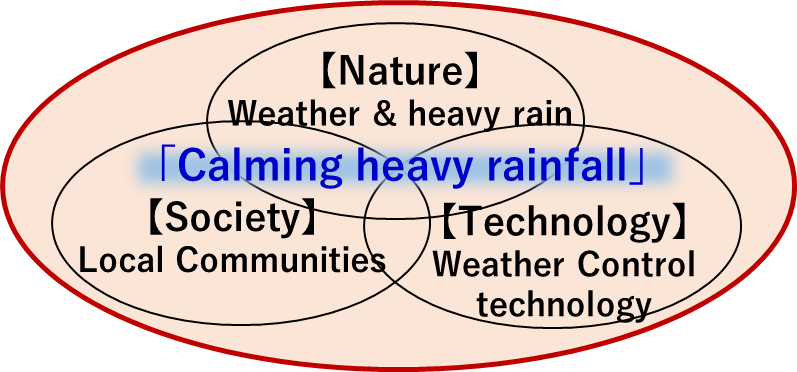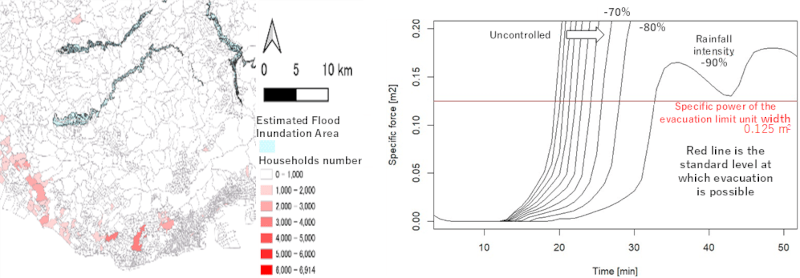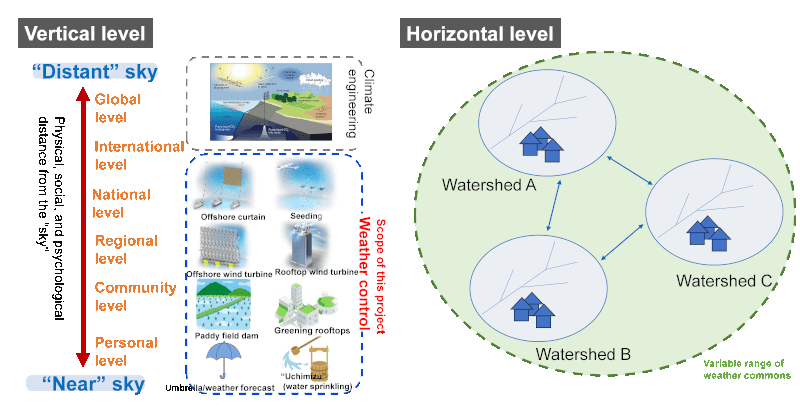Progress Report
Heavy Rainfall Control for Living Together with Isolated-Convective Rainstorms and Line-Shaped Rainbands[3] Research on impact assessments of heavy rain control and social acceptance
Progress until FY2024
1. Outline of the project
Establish heavy rain control scenarios and evaluate the effect of controlling flood flows by heavy rain mitigation as a first step toward estimating the natural impacts of reducing heavy rains. Consider the risk of rain areas shifting due to the control of heavy rains and causing floods or droughts in other basins. Estimate the impact on water resources and society, and evaluate how a water-based society will change, by considering the behavioral changes of the residents.
Additionally, construct a conceptual model, “weather commons,” that captures the mechanism of cooperation by local residents to live with heavy rains reduced using new regulatory technologies, and clarify the conditions for its establishment (Fig. 1). Construct social and institutional response scenarios for ELSI/RRI topics based on this conceptualization.
The awareness of “living in the bosom of nature,” where people revere and co-exist with nature, will permeate, and the scope of application of heavy rain regulation techniques will be decided within the scope of “people living their lives by borrowing the bosom of nature.”

2. Outcome so far
①Effect of heavy rain control on inundation suppression
The control effects on average rainfall in the river basin and flood peak discharge were analyzed by inputting the calculation results of heavy rain control simulations into a rainfall-runoff model. The analysis found that the scale of flooding could be reduced by up to approximately 20% in the river basin with the highest average rainfall (Fig. 2).

②Strategic examination for solving ELSI
ELSI refers to ethical, legal, and social issues, and factors such as the uncertainty of nature, environmental impact, and the effects on residents' disaster prevention awareness system are important to consider. The implementation of weather control was examined, and a framework for identifying and addressing specific ELSI issues was developed. Additionally, planning and regional collaboration considerations for future small-scale outdoor experiments were organized, as shown in Figure 3.

③Examination of positioning of weather commons
The project embraced the concept of focusing technological development around societal visions rather than basing the ELSI on technological advancements. This shift in perspective was recognized as a critical governance issue for managing the weather commons. These included the organization of local residents and stakeholders into a “commons,” promoting symbiotic relationships with weather patterns and disasters, developing non-normative ethics based on local community practices, and encouraging citizen participation in technological development. Additionally, the term "weather control" was scrutinized. The team explored linguistic choices informed by traditional views of nature and social acceptability within the context of the weather commons, ultimately proposing the term "calming heavy rainfall" for theoretical discussions (Fig. 4).

3. Future plans
We have developed multiple scenarios that vary in the extent of heavy rainfall control to evaluate the effectiveness of flood flow management. Moreover, we formulated methods for assessing self-sustaining symbiotic control techniques to support the formation of a weather commons. Additionally, we are designing social and institutional response scenarios to address ELSI topics.